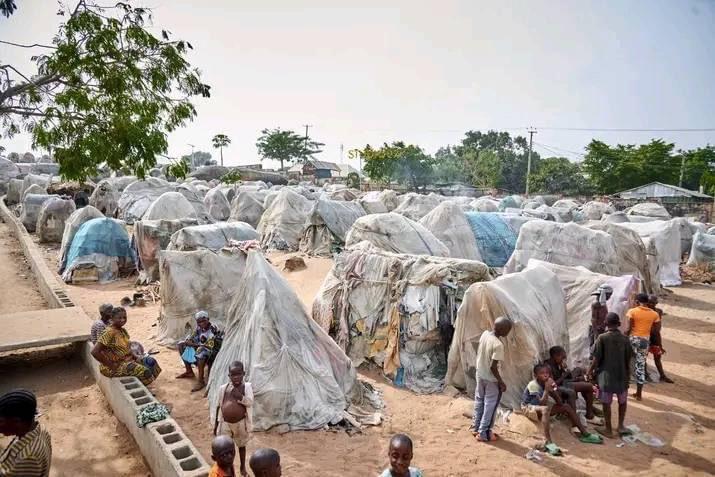Internally Displaced Persons (IDPs) in Nigeria represent one of the most vulnerable populations in the country. Conflicts, violence, natural disasters, and other crises have uprooted millions of Nigerians from their homes, stripping them of their livelihoods and subjecting them to unimaginable hardships. As of 2024, there are over 3.2 million IDPs according to the United Nations High Commissioner for Refugees (UNHCR) in Nigeria, mostly concentrated in the northeastern part of the country.
IDP plight in Nigeria is a pressing humanitarian crisis that demands urgent action from the Nigerian government, donor agencies, local and international organisations, well-meaning individuals both in and outside Nigeria. The IDP issue must be reprioritised, interventions aligned toward long-term solutions that will restore the dignity and self-reliance of IDPs.
But wait, who are IDPs? IDPs are individuals or groups who are forced to flee their homes but remain within their country’s borders. Unlike refugees, IDPs do not cross international boundaries, leaving them under the care and protection of their own government. Sadly, in Nigeria, this protection is often inadequate.
IDPs are particularly vulnerable because displacement often results in the loss of homes, farmland, sources of income, access to healthcare, and education. In displacement camps or host communities, they face overcrowding, inadequate sanitation, food shortages, and insufficient access to clean water and healthcare. Many IDPs live in makeshift shelters, creating a bleak existence marked by uncertainty, poverty, and fear.
Northerners have no moral right to reject Tinubu in 2027– Shehu Sani
Shehu Sani to Lamido: Look beyond politics on security issues
Causes of internal displacements in Nigeria are many and varied. They include the Boko Haram insurgency, ongoing since 2009, which has displaced over two million people in the northeast. Communal and ethnic clashes, for instance in Plateau State, has witnessed ethnic and religious tensions between indigenous groups and so-called settlers and triggered waves of violence since the early 2000s. Recent clashes between farmers and herders have displaced over 250,000 people as of 2023. Likewise, in Taraba State ethno-religious violence, particularly between the Tiv and Jukun ethnic groups, has caused the displacement of over 150,000 people since 2018.
Banditry and kidnappings between 2020 and 2023 have displaced an estimated 500,000 people in southern Kaduna and other affected regions. Villages have been sacked, farmlands destroyed and entire communities forced to flee to safer areas or IDP camps in Kaduna city and surrounding towns. In Zamfara State, particularly in rural communities, this has displaced over 700,000 people since 2019. Additionally, in Katsina State, an estimated 200,000 people have been displaced due to kidnappings and attacks.
The aspirations of IDPs are simple and human. They wish to return home, rebuild their lives, and live in dignity. For many, the hope of returning to their villages or towns seems increasingly distant as insecurity persists. They aspire to regain access to education, healthcare, and livelihoods. They yearn for a sense of normalcy and security, something they had before!
Despite these simple aspirations, IDPs remain trapped in a cycle of deprivation, facing barriers that prevent them from achieving their goals. A return to their homes is often impossible due to ongoing violence and access to education and healthcare is limited by inadequate infrastructure in the camps. Many IDPs are also caught in a web of dependency on humanitarian aid, with little opportunity to become self-reliant.
Meanwhile, the Nigerian government’s response to the IDP crisis has been inadequate and poorly coordinated. IDPs are often neglected in policy discourse, and their needs are deprioritised in favour of other political and economic issues. While some government agencies, like the National Commission for Refugees, Migrants, and Internally Displaced Persons (NCFRMI), exist, their efforts have been undermined by corruption, ineffective coordination, implementation and their yearly budget inadequate to cater to the most basic needs.
So also is that of the National Emergency Management Agency (NEMA) in managing IDP camps. Reports suggest that their work has not always met expectations, particularly in terms of providing adequate support and resources.
Another distressing thing is the absence of a clear legal framework to protect IDPs which exacerbates their vulnerabilities. Although Chapter II: Fundamental Objectives and Directive Principles of State Policy in the 1999 Nigerian Constitution, as amended, guarantees the right to life, dignity, and freedom from discrimination, these rights are often not extended to IDPs. The chapter also mandates the government at all levels to ensure the security, welfare and well-being of all citizens in Section 14(2)(b).
Section 16 also emphasises economic justice, calling for the government to manage resources efficiently and ensure that every citizen has access to equal opportunities for economic growth and development, and Section 17 which focuses on social justice, where governance must reflect equity, fairness, and inclusiveness. It guarantees protection from discrimination and emphasises the need for the state to provide security, employment opportunities, and basic needs such as education and healthcare.
Donor agencies, while providing much-needed assistance, are also not immune to criticism. Their efforts, while commendable, sometimes fail to address the root causes of displacement or provide sustainable solutions.
Hon Rabi’u, a monitoring & evaluation specialist on policy, finance and good governance, resides in Kaduna

 Join Daily Trust WhatsApp Community For Quick Access To News and Happenings Around You.
Join Daily Trust WhatsApp Community For Quick Access To News and Happenings Around You.


